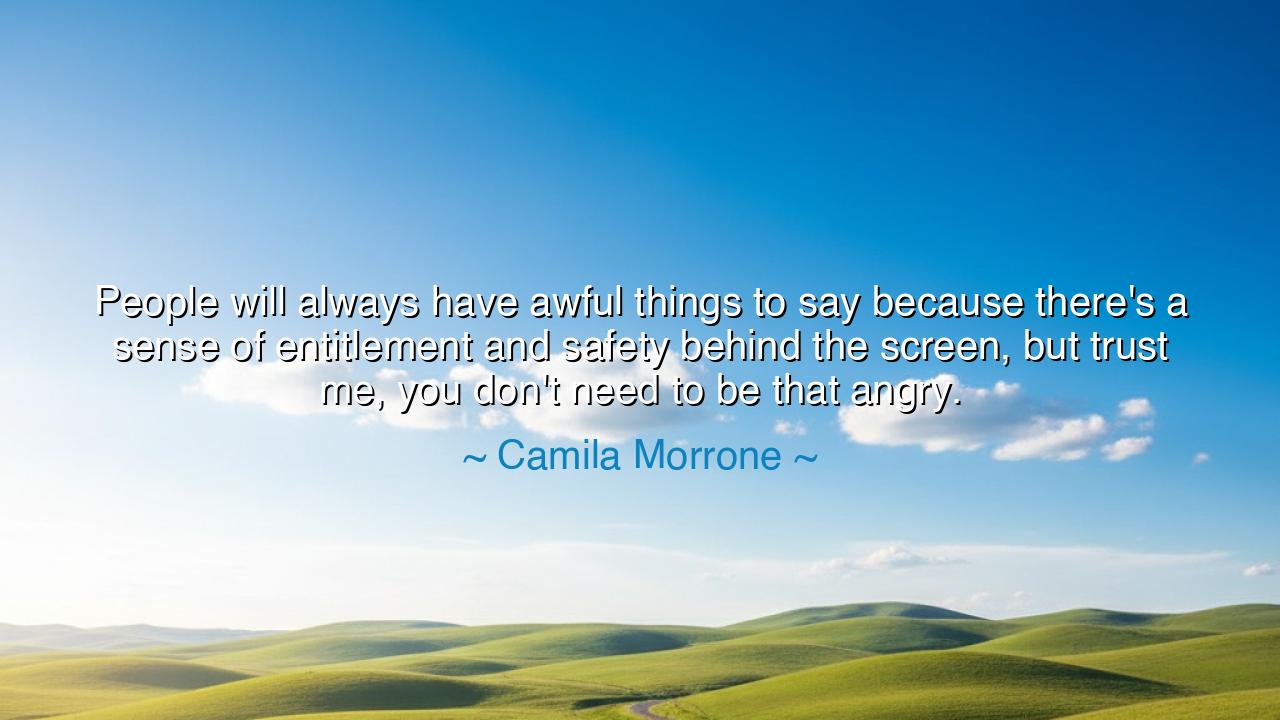
People will always have awful things to say because there's a
People will always have awful things to say because there's a sense of entitlement and safety behind the screen, but trust me, you don't need to be that angry.






Hear now the words of Camila Morrone, whose wisdom speaks to the heart of human nature in the age of digital communication: "People will always have awful things to say because there's a sense of entitlement and safety behind the screen, but trust me, you don't need to be that angry." In this simple yet powerful statement, Morrone offers a profound reflection on the nature of online interactions and the ease with which people express anger and hostility in an environment that feels safe from consequence. It is a truth as old as humanity itself—people, when freed from the immediate consequences of their words, will often lash out in ways they would never do in person. Yet, as Morrone wisely suggests, it is not our fate to succumb to such anger. We can choose a different path, one of peace and understanding.
In the ancient world, the philosophers understood the power of words and the harm they could cause when spoken in anger. Socrates—that most revered of thinkers—believed that to live a good life, one must learn to control the passions, especially the destructive passion of anger. He taught that true wisdom lay not in reacting hastily to insults or injustices, but in pausing, reflecting, and responding with reason. Socrates knew that words, once spoken, could never be unsaid, and that the damage done by anger could echo far beyond the moment. His teachings remind us that while we cannot control the words of others, we can control our own reactions and rise above the impulse to strike back in kind.
The ancient Romans shared similar wisdom. Seneca, a Stoic philosopher, wrote extensively on the dangers of anger and how it corrupted the soul. He believed that those who allowed their anger to fester were like warriors who wounded themselves in battle, for anger clouded the mind and destroyed one’s ability to think clearly. For Seneca, it was essential to cultivate self-mastery and to guard against the urge to retaliate when insulted or attacked. His teachings echo Morrone's advice: even in the face of provocation, we do not need to let anger define our actions. The peaceful mind is the most powerful, and it is through calmness that we can truly confront the injustices of the world.
The story of Marcus Aurelius, the Stoic Emperor, further illustrates this. Aurelius faced constant challenges as ruler of the Roman Empire, including criticism from his enemies and strife within his own government. Yet, in his Meditations, he often wrote about the importance of accepting insults with dignity and maintaining a calm mind in the face of adversity. One of his central teachings was that peace of mind comes not from the actions of others, but from our ability to choose how we respond. Just as Morrone suggests, Aurelius believed that we are not powerless in the face of hostility; rather, our true strength lies in our ability to rise above it and choose a different path—one of understanding and grace.
Morrone’s words resonate deeply in today’s world, where the anonymity of the screen emboldens individuals to say things they would never dare say in person. The digital age has brought with it a new form of disinhibition—a belief that behind the screen, there are no consequences for hurtful words. But as Morrone wisely points out, this sense of entitlement does not obligate us to respond in kind. In fact, it is all the more reason to rise above the anger that is so easily stirred in us. We do not need to be angry in response; we can choose to live with equanimity and peace, knowing that our true power lies in how we manage our emotions.
Consider the life of Mahatma Gandhi, whose remarkable journey for India’s independence was marked by his unwavering commitment to nonviolence and peace. Gandhi faced countless insults and attacks, both personal and political, yet he never allowed anger to cloud his vision. He believed that in the face of hostility, one must remain calm and firm in one’s values, for only then could true change occur. Gandhi’s life shows us that the path of nonviolence is not one of weakness, but of profound strength. The ability to remain peaceful in the face of provocation is an act of incredible inner fortitude, and it is this peace that fuels true, lasting change.
The lesson here, O children of wisdom, is clear: we must learn to master our responses in the face of anger and hostility. Morrone’s advice reminds us that while we cannot control the words or actions of others, we can control how we react to them. Choose peace over anger, calmness over hostility, and understanding over retaliation. This does not mean we become passive or allow others to walk over us—it means we choose to respond with wisdom and dignity, rising above the noise of the world and acting from a place of inner strength.
In your own life, remember that anger may be an immediate reaction, but it is not the answer. When provoked, take a moment to pause, to breathe, and to choose a response that reflects your highest self. Whether online or in person, let your words be those that reflect peace, understanding, and wisdom, not revenge or bitterness. By doing so, you will not only protect your own peace of mind, but you will set an example for others, showing that true strength lies not in the ability to fight back, but in the ability to remain composed and act with grace in the face of provocation.






AAdministratorAdministrator
Welcome, honored guests. Please leave a comment, we will respond soon